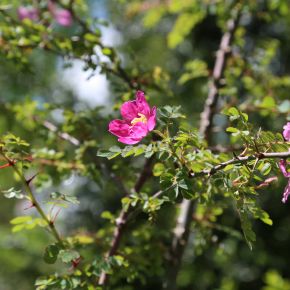Rosa willmottiae
(Willmott's Rose)
Family - Rosaceae
Category - Rose
Origin - Western China
Discovered By - Ernest Wilson
Year of Introduction - 1904
Season of Interest - Spring, Summer
Hardiness - H6
Height - up to 2m
Width - up to 2m
Location - The Thicket
Description: A vigorous Wild Rose that has upright, arching stems that are covered in long, sharp prickles. Aromatic, grey-green, pinnate leaves have small, oval to rounded leaflets with finely toothed margins. Single, bowl-shaped flowers open magenta-pink and fade to a paler shade of lilac-pink with age. Each Bloom has a prominent central cluster of pale yellow stamens. The flowers are produced along the stems from late spring into early summer and are followed by red, pear-shaped hips. R. willmottiae was discovered by plant hunter, Ernest Wilson, and named for the famous gardener, Ellen Willmott.
Synonym - Rosa gymnocarpa var. willmottiae
Flower:
Single, bowl-shaped flowers open bright magenta-pink and fade to a paler shade of lilac-pink with age. Each flower has a prominent central cluster of pale yellow stamens. The flowers are produced singly along the stems in May and June and are followed by red, pear-shaped hips. Little or no fragrance.
Flower colour: Pink
Flower shape: Single, bowl-shaped flowers
Flowering time: May, June
Foliage:
Aromatic, grey-green, pinnate leaves have small, oval to rounded leaflets with serrated margins. The leaves are aromatic and Alternately arranged on upright branches with long prickles.
Foliage Senescence: Deciduous
Foliage Shape: Pinnate with oval to rounded leaflets
Propagation:
Cuttings, grafting.
Cultivation:
Best in full sun to partial shade in fertile, moisture retentive soil that is well drained.

